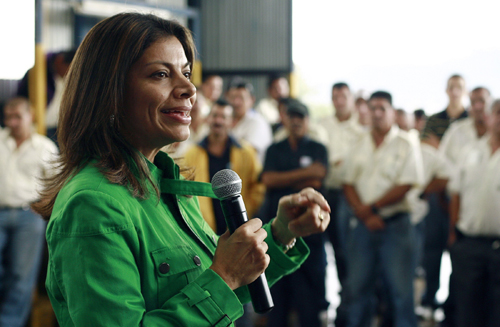Chinchilla becomes Costa Rica's first female president
Ruling party candidate Laura Chinchilla declared victory on Sunday night in Costa Rica's presidential election with most of the vote counted.
Chinchilla won 46.8 percent of the vote from 67.9 percent of the votes counted by the Supreme Electoral Tribunal. Under the country's constitution, a candidate is required to gain at least 40 percent of the popular votes to win outright.
Chinchilla's two main rivals Otton Solis of the Citizen Action Party (PAC) and Otto Guevara of the Libertarian Movement Party (ML), have conceded defeat and congratulated her on being elected the country's first female president.
"With a lot of respect, we accept the reality," said Solis, who was just 1 percent of votes away from a victory in 2006 elections.
Chinchilla, the 50-year-old vice president for incumbent President Oscar Arias, told the public that she, as the next president of the country, would keep what she had promised during the campaign.
"We don't receive a bounced cheque from the people. To the contrary, we have shouldered solemn obligations to hold dialogues with all parties and social sectors," she said.
Chinchilla's campaign platform included improvement of the country's infrastructure, creation of a progressive income tax and new jobs with "green jobs" initiative.
She also has promised to create more job opportunities, better living conditions for children and senior citizens, as well as to combat crimes and drug trafficking.
Chinchilla, a graduate of Georgetown University in Washington, D.C., started her professional career as a consultant.
She became the first female minister of public security from 1996 to 1998. Chinchilla joined the Legislative Assembly in 2002 and was tapped to be first vice president for incumbent President Oscar Arias in 2006.
Chinchilla was expected to continue the policies of promoting free trade and international business ties carried out by President Arias. Earlier, oppositions criticized her for acting like Arias' puppet.
The presidential voting was part of the general elections in Costa Rica which took place from 6 a.m. local time (1200 GMT) to 6 p.m. (2400 GMT).
Some 2.8 million Costa Ricans have registered to choose a new president who will serve a four-year term, two vice presidents, 57 parliamentarians and 495 local deputies. However, nearly 32.3 percent of the registered voters did not go to the polls.
Costa Rica is the only Latin American country which in 60 years has enjoyed democratic elections without interruption, said Emma Maria Mejia, chief of an observer mission from the Organization of American States (OAS).
 0
0 







